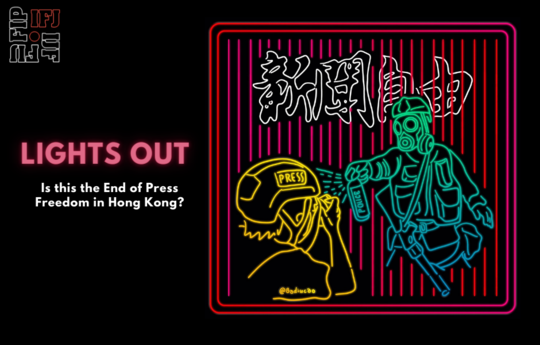In its latest report, the IFJ documents the detainment and jailing of journalists after inadvertently crossing invisible “red lines” set out under the new National Security Law. News outlets including Apple Daily have been forced to close down or move offshore since the law’s implementation, and the once strong public service broadcaster Radio Television Hong Kong (RTHK) has been steadily transformed into a government mouthpiece.
The IFJ’s report Lights Out: Is this the End of Press Freedom in Hong Kong? details the slate of weapons used in Hong Kong to restrict the work of independent journalists. In the period covered by the report, foreign journalists have been denied visas, whilst the blocking of websites has increasingly restricted access to international news. The IFJ also notes that Hong Kong’s government is currently proposing a new law against so-called “fake news” that could criminalise any reporting labelled as disinformation by officials.
Foreign news organisations including The New York Times began relocating staff after the law’s implementation in 2020 to South Korea, a sign of Hong Kong’s declining reputation as a bastion of press freedom in Asia and the perceived risks that a Hong Kong base posed to those operations. An increasing media exodus mirrors a trend towards broader outward emigration that is symptomatic of citizens’ loss of faith in their society and its institutions.
Orchestrated campaigns to shut down civil society organisations, including journalism advocacy and representative bodies are also highlighted, the IFJ said. “Such campaigns fundamentally violate citizens’ right to freedom of association under various international legal instruments and diminish Hong Kong’s standing in the international community.”
The latest examination of China’s media follows the IFJ’s report released ahead of the Beijing Winter Olympics Fair Game: The Endangered Media Space For Foreign Correspondents Inside Chinawhich reveals the ways in which China is limiting foreign correspondents’ access and reporting in China. While China itself clamps down on journalists through expulsions, delays and denials in granting visas, intimidation of sources, digital and physical surveillance, and lawsuits alleging breaches of reporting protocols, it is also massively expanding its own media influence and operations globally.
The IFJ has maintained a dedicated program on Hong Kong and China press freedom since the Beijing Olympics began opening doors for media freedom inside the country in 2008. Since 2019, the IFJ has expanded its work to explore China’s increasing global media influence and impact more closely and continues to seek stronger engagement on media issues to solve broader industry challenges for media sustainability.
Key findings and recommendations in the report:
- The IFJ remains gravely concerned at the rapid collapse of Hong Kong’s free media since the enactment of the National Security Law in 2020 and for the ongoing safety and well-being of professional and independent journalists in the Special Administrative Region of the People’s Republic of China (HKSAR).
- The IFJ notes a clear and documented closure and exodus of both local and international media outlets, journalists and media workers that once earned Hong Kong a reputation as a bastion for media excellence in the Asia region.
- The IFJ calls on governments around the world to support journalists seeking to leave Hong Kong or find temporary refuge to continue their professional careers as journalists in exile.
- Journalists and media seeking to report in Hong Kong should be given visa access to allow a diversity of reporting on Hong Kong and China to continue.
- The IFJ notes that orchestrated campaigns to shut down civil society organisations violate citizens’ right to freedom of association under various international legal instruments, including the Universal Declaration of Human Rights, and diminish Hong Kong’s standing in the international community.
- International media and media organizations must continue to express solidarity and support for their Hong Kong counterparts and continue to protest to the Hong Kong and the People’s Republic of China (PRC) authorities for their repression of freedom of the press and freedom of speech.
The IFJ said: “Critically, the IFJ’s report on Hong Kong documents how independent reporting has been torpefied by the National Security Law, with journalists forced to self-censor out of fear of excessive recriminations by a government that increasingly follows the Beijing line and has little tolerance for criticism or debate. For those not professionally willing to do that, it appears to be nearing the end of the line for free and independent media as it has been known in Hong Kong.”

